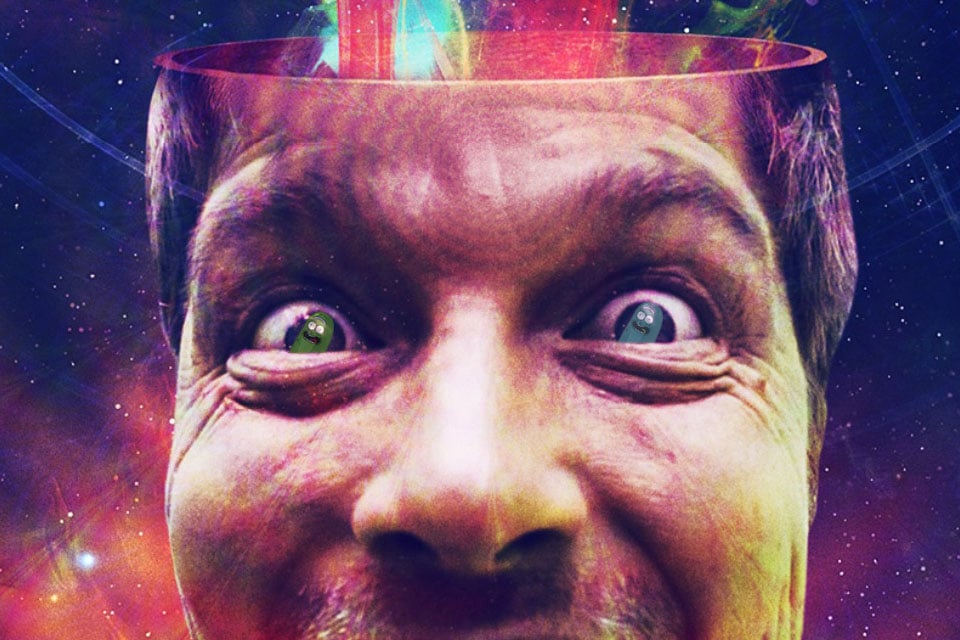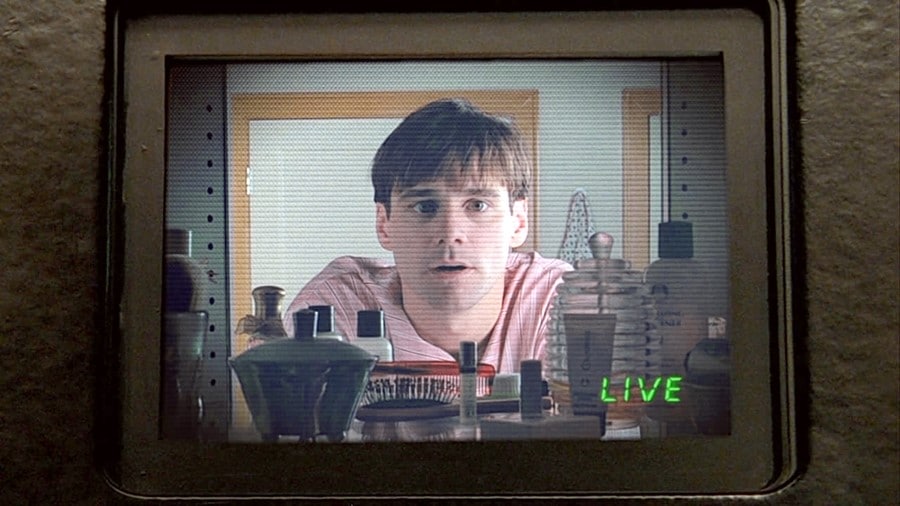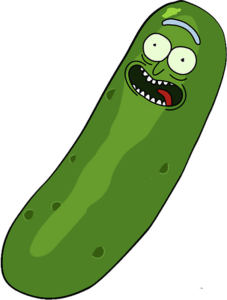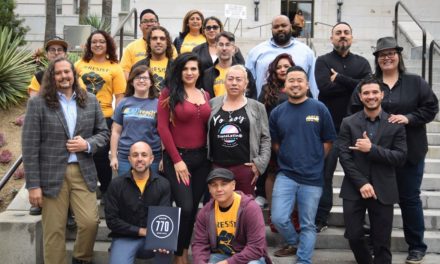Comedian Shane Mauss has had a long, strange trip with psychedelics. As a young adult, they helped him ease his depression, opened his eyes to new worlds and ideas, and were endlessly fascinating to his scientific and curious mind. After many years of a highly successful stand-up comedy career and podcast, Shane decided to make an experiential film that would document his psychedelic experiences and speak to their many benefits, bolstered by interviews with luminaries such as Rick Doblin and Dennis McKenna.
Psychonautics: A Comic’s Exploration Of Psychedelics is the fruit of that journey, and it is everything Shane set it out to be and more. If you have not seen Psychonautics yet, spoiler alert: Shane ends up in a mental hospital after serious bouts of mania make him lose touch with reality. The story has a sobering but ultimately happy ending, and while Shane receives a diagnosis of bipolar disorder and takes a big step back from psychedelics, he has bounced back from the experience with humor and seen great continued success with his comedy and podcast career. I spoke at length with Shane about this strange journey and the light and dark side of psychedelic exploration.
Thanks so much for speaking with us Shane. I just saw Psychonautics and really loved it!
Thanks man! It’s nice to have it out and get such positive feedback from everybody. It’s weird now, it’s been almost two years since we stopped filming and I pretty much haven’t done psychedelics since that time. So it’s a little strange for me to look back on it now, not being in that headspace.
How much has your headspace shifted?
Quite a bit. I’ve shifted gears; I’ve put a lot more effort into my science podcast and this new show “Stand Up Science” which is this live show with two scientists and two comedians on each show. So I don’t find myself talking about psychedelics nearly as much as I did then, except now that the movie’s out I’m talking about them more again and reopening those connections in my mind a little bit.
But yeah, I feel a little detached from that world and I miss it. I’ve experimented with doing some mushrooms since that time and I’ve had a couple other much more mild manic episodes since then. I don’t trust myself in the psychedelic space anymore, and it’s really unfortunate. So now I’m having to learn how to manage my depression without the aid of psychedelics, which have always been hugely helpful and useful for me.
It’s interesting— I miss them, and I’m also far more towards the skeptical side of things. Yet I know if I were to smoke DMT right now, I’d be like “Nope, this is a different universe, something else is going on!” [laughs] But right now, I’m so far away from that headspace and I’m much more in the intellectualizing and coming up with scientific reasoning of what those experiences are. I don’t trust a lot of my perceptions of my past memories and past experiences the further I get away from them. I feel like I’m losing touch with that headspace and I miss it a little bit. After the filming, I told myself “I’m not going to think about psychedelics; I’m not going to think about synchronicity; anything that even has a whiff of synchronicity I’m going to completely ignore it and go the other way.”
Going to a psych ward, going on meds and all that is just not a pleasant experience, and it was really confusing too. I think partially it was confusing because I am so skeptical and I do want there to be a scientific explanation for all of these things and I really strived to come up with neurological reasons for what’s happening in those spaces. I was resisting a lot, where many people would have just been like, “This is great! I’m God, everything’s God, we’re all God!” and just rode the wave a little more than I did. But it definitely messed with me quite a bit. I’m not in a rush to go through anything like that again.
It was so different than anything that had happened in my 22 years of psychedelic use previously. I never had the television start talking to me consistently, getting secret messages through every song and everything on the radio, synchronicities constantly all through the day, and wondering what is reality and thinking all of this is some trick being played on me or some Truman Show kind of situation. I had never experienced anything like that before, and I got hit pretty hard with it. So I’m kind of in a weird place right now, where I feel I could really use psychedelics, but for the first time in my life I don’t trust myself with them.
What stood out the most to me about this film was that you set out to make this pro-psychedelic documentary, like “They’re not so scary, they’re great!” and then it ends up being this cautionary tale. In a way I think that’s a good thing too, giving a balanced rather than over-exuberant perspective. I’m curious, especially as you’ve had time to reflect on everything, how do you feel about the arc it ended up taking?
If I was going to have some sort of mental episode no matter what, and it was going to happen eventually anyway, then what great timing!
[Laughs]
For one, it made the documentary really interesting. We had no idea what the documentary was going to be and what story we would be telling until I lost my mind and we just had to figure it out. And two, it would have been far more over-exuberant had it not been for my cautionary tale. I mean, I thought it was kind of perfect in that regard.
I will say I don’t know how much the filming of it itself played into what happened with me. I had these Truman Show-ish paranoias during some psychedelic experiences that I could usually ignore, but they are a lot harder to ignore when there are literally cameras on you.
[Laughs]
So did that perpetuate it? There are so many factors that happened. I felt like I was having more experiences more frequently in higher doses. What we don’t show in the documentary is how often I was eating mushrooms at that time, which was like 3 times a week at pretty high doses. I was trying to tap into that experience and figure out how to articulate it, and writing about what I wanted the film to be. So I was kind of on my way with early onsets of mania before those last triggering things with DMT, which set a few things in motion, and then ayahuasca which really pushed me over the edge. Had it not been for all of that, I think that it would have been different.
Would I have thought that I was being selected for some special mission and Roger Waters was telepathically talking to me had I not also been filming myself and making this documentary which fed into this narrative of “Maybe I am this spokesman for this movement” or something? I don’t know that it would have happened had I not been making the documentary, but there’s a possibility that I was heading that way anyway.
Nothing is worth having that experience. It’s definitely not worth it if you’re sitting there at home and think, “I want to make an interesting documentary! I guess I’ll just drive myself insane!” It’s not worth going insane to make a documentary that who knows how many people are even going to see slightly more interesting. At the same time, I don’t know how much I regret any of it. Ultimately, in terms of the documentary itself, it did make for a much more balanced film than it would have, for sure.
Yeah, the whole story of ayahuasca talking to someone and asking them if they want to accept this grand mission to basically spread ayahuasca is something I’ve come across so many times.
Yeah, it seems like ayahuasca isn’t terribly picky. It’s just desperate to get the word out there. She’s taking anyone that shows up and going, “You’ve been chosen!”
[Laughs]
Yeah, I think everyone that’s done ayahuasca has been chosen.
[Laughs] You know, pretty much every time I’ve heard that story, it’s been a positive thing. It puts people on a path of writing a book or learning to facilitate or giving some workshops or something. This is the first time I’ve heard of where it put someone down a path that was a little bit too intense and had some serious repercussions.
Yeah, I mean it might be coupled with my depression and low sense of self worth that I don’t really trust or necessarily want to be part of a universe that is dependant on me to save it. That’s a sure sign that things are pretty hopeless when it’s turning to me, an exceptionally lazy and disorganized comedian.
[Laughs]
The experience of it was that I was being tasked with some sort of mission, and that idea was not fun or exciting to me in any way; it just made me incredibly anxious. In the worst of it, I thought that all of life was a kind of metaphor for universal consciousness which is inside me and inside of everything else. So when I was freaking out and being paranoid and anxious, it was at the exact same time that Trump was taunting Kim Jong Un with the nuke situation, and I’m like, “Is this just a metaphor for how I’m an egomaniac? Is that why there are these two egomaniacs that are going to blow each other up, because there’s all this inner conflict in my own mind? Am I going to destroy the world because I can’t get my head right?”
It was really intense and delusional, and it definitely wasn’t like, “Hey fun! I’m a messenger for universal consciousness!” It was much more of an impossible-seeming task in which every single thought that I had, every decision that I made, every step that I took was having some sort of butterfly effect and causing this cascade of unpredictable repercussions. Anytime I tried to clear it up or do something good or set things on the right track, it backfired on me in some way because this was some sort of practical joke that I was playing on myself, or something like that. It was very confusing.
I look back on that experience and sometimes it’s hard to think about. I’d have these exciting ideas and then I’d share them with people, and then afterwards I would think, “Oh that’s stupid, you shouldn’t have said that to this person, you’re crazy or wrong” and then I would construct some other version of the story that would be better, but then that would be equally crazy. I just wouldn’t give it up or let myself believe that I had a little psychosis. So I look back at some of those experiences and they’re a little bit embarrassing. I’m happy to make myself vulnerable and I’m glad that I got to do that on the film. Certainly when I’m going to be making myself vulnerable, I prefer to be getting paid for doing so.
[Laughs]
Most comedians make their livings off of sharing the most embarrassing aspects of themselves, but it’s fucking embarrassing to share with people that I thought Roger Waters was telepathically communicating to me in a concert and that I was some chosen person. I remember being in the psych ward, and they had Rick and Morty on at some point, which, I don’t know how that show is allowed to be on in a fucking psych ward. I had myself convinced that I was Pickle Rick for a hot minute.
[Laughs]
[Laughs] That shit’s embarrassing! And it still haunts me once in a while. I’m someone who ruminates quite a bit and I probably beat myself up too much. I have a hard time letting shit go from even middle school, where I said the wrong thing trying to be cool in front of the cool kids, and made an ass out of myself. When I was 13 years old, some nothing thing, I still get embarrassed about it. Two years ago I thought I was Pickle Rick, and my fucking family had to come and institutionalize me and all this shit. I don’t know how long that’s going to stick with me; probably for the rest of my life.
Let’s talk about the benefits: what positive things did you get out of this experience?
There was a period of time afterwards where I really felt like the best version of myself. I left alcohol and smoking behind, which is no small thing, and for a long while I was exercising more than I ever had before. And I feel like right now I’m doing the best work of my career. I have this Stand Up Science show that is doing well for me, and my science podcast that I’m really proud of. I feel like I’ve been getting better as a host. There’s something about that time that— I don’t know if it made me not care or something, but I’ve felt more comfortable hosting my podcast and on stage ever since. I think it’s just because I don’t give a fuck anymore, and that’s a nice place to be in if you’re a performer.
I really believe in psychedelics and their potential. I’d love to see them researched more, I’d love to see them in clinical settings, and I really think they could benefit so many people. I’m a little biased, and I’m trying to sell a psychedelic documentary that I want people to watch. I have a million biases, so I don’t know if I’m just putting a silver lining on the story of what happened and saying, “Well you know, I’m the best version of myself!” I’ve had some rock bottom experiences with alcohol that encouraged me to make positive changes as well, and I don’t sing the praises of alcohol.
But there’s still a part of me that is curious. Say I was diagnosed with a terminal illness or something. One of the first things that I would do is get some DMT or ayahuasca; that’s absolutely one of the very first things I would do. There’s still this pestering “What the fuck is that? What are those experiences?”
Right now, I would tell you that I believe it’s our inner world, and that our brains are far more powerful and complex than we realize. It’s just this different perception in consciousness and it feels like you’re going to some other dimension or reality, but that’s not actually what’s happening. But there’s still a part of me that’s like, “I think that’s some other fucking world that exists” and still a big part of me that makes me think “Is any of this real? Is this in my mind? Am I sitting here talking to myself right now? What the fuck is this?”
So yeah, I’m as confused as I’ve ever been about psychedelics. I don’t have any clear answers. It would have been cool to come up with some clear answers to end the documentary on, but my goodness, that’s the thing about psychedelics— there’s nothing boring about them. Maybe some people’s trip reports can be like hearing about someone’s dream when they are doing a poor telling of it, but the experience of it itself is just—I mean, even if I never did another psychedelic for the rest of my life, I think 30, 40 years from now I’d be thinking, “What the fuck was that?” It’s just so strange.
Right. You sort of already answered it, but do you ever think, “Did I just get to the edge of a breakthrough and then chicken out? Was I reined in by family and friends when I was right at the membrane and ready to poke through?”
Yeah, that was the feeling of it for sure. Part of the problem was that once I started sharing my experiences with people in the psychedelic community, they’d be like, “Cool! I think you’re onto something! Maybe Roger Waters IS talking to you!” [laughs]

Image courtesy Alterna2
[Laughs] He’s talking to me too, let’s share notes!
But anyone else would be like, “What the fuck are you talking about?” It was discouraging and it made me second guess myself so much. Maybe I was right, too— maybe had I not pumped the brakes, things would have only gotten much worse. At the time, I was like “I’d better write all this stuff down or I’m going to forget” but everytime I started writing it down, I was getting it all wrong— it would twist on me, it was just this series of puns, this monkey’s paw that I was just wishing on for all of the wrong things. Everytime I’d think I figured out something, I was just off in this one crucial way.
Are you familiar with True Hallucinations, and Terence and Dennis McKenna’s experiment at La Chorrera?
No, I haven’t read it but I should. One of the intriguing things about psychedelics is that, like I said, I don’t read about psychedelics or research psychedelics other than once in a great while, but I explain my experiences, which are the craziest sounding things, and explain some of my ideas about what’s happening, and then someone will be like “Terence McKenna thought the exact same thing 30 years ago!” It’s really interesting for sure, to see entities in a DMT state that other people report seeing without you telling them about them. Other people saying they saw things that had messages for you that make all sorts of sense. Really strange things like that happen with psychedelics. It’s some spooky stuff, really.
Spooky is a good word. There’s definitely something there that we don’t quite understand. It’s surprisingly common.
Part of my experience was that all these entities seemed so important and interesting and fun, but who’s to say they’re not just playing some kind of trick on you or manipulating you? The 100 or so times that I had smoked DMT, it felt like I was transporting my mind into this other place and gaining information about this other dimension, or making observations about it. But what I didn’t realize is that the whole time it was a 2-way street, and those things— whatever the fuck those things are— were also gaining access into my mind. It felt like there was something trying to take over my body; even my girlfriend felt that. I would wake up feeling like I was possessed, literally trying to shake something out of my head, and my girlfriend at the time thought that I was possessed or something like that. My eyes looked different. It was this really strange experience.
So that’s another thing that makes me nervous about venturing back into psychedelics. DMT was already getting really strange on me. I had already gone about 9 months without smoking it before the documentary because it was getting too intense, then I smoked it for the doc and didn’t expect such an intense experience. But it was very intense. Something in another dimension was like, “Great, you brought the cameras! Now tell people what this thing is!” DMT is so fast and intense, who can take much of anything away from it? Yeah, I don’t know. It all felt very real at the time. Now it just feels confusing.
The McKenna brothers had a similar kind of intense reality-twisting experience at La Chorrera. Terence sort of kept running with the mania and eventually came up with his Timewave Zero theory obsessing about the nature of time and this apocalyptic vision, with his own birthday at the center of a universal pattern related to the I Ching. But for Dennis, even though he was the one who had the deepest visionary experience during that trip, he stepped back and said, “Maybe I should go back to school and become a researcher and reground myself.” Terence was an amazing guy but no one really took his Timewave theory seriously.
Yeah, there’s a lot of egocentrism in those experiences, for sure. Everything is related to everything, everything is a metaphor and association for another thing, and it always come back to being related to you in some way. You watch some TV show that was made 5 years ago, but it’s definitely talking to you in this specific moment and telling you exactly what you need to do.
Have you heard the term “pronoia”?
No, I haven’t.
It’s the opposite of paranoia, so it’s this feeling that the Universe is conspiring to help you.
[Laughs] Ah that’s lovely!
It’s funny because the hyper-synchronicity you’ve been talking about can be a good thing at a certain level. I feel like we have these unconscious understandings, and for whatever reasons, we’re just allowing external stimuli to trigger something that we already know within ourselves. We correlate it as synchronicity— ‘the song is talking to me’— but it could just be that you’re of the right mind when you hear that lyric and you’re applying it to yourself more deeply— basically you’re just paying closer attention.
Right, right.
And the channel to your deeper self is more open. So that can be a good thing. I experienced this after a really strong psilocybin experience in college, but it never became dangerous. It’s interesting that there seems to be this line. In some ways, we are the center of the universe, in some ways we are all the messiah, we are all connected with everything else, we are made out of the same stardust. Our actions do have butterfly effects, for sure. But I can see how it can easily go too far and slip off the deep end. Full-on messiah complex, ego death gets flipped into hyper-ego inflation, the whole world depends on me. There has to be a healthy balance.
Yeah, you don’t want the whole world depending on you, that’s for sure. Noooo thank you! [laughs]
Shane, it’s been so great speaking with you. Any final thoughts? Where can people check out your work?
The main thing I’m pushing right now is my Stand Up Science Tour, because it’s what I’m going to be doing for the foreseeable future. It’s a different show each time. The other comedian is different, and the two scientists are different at every show. It’s something I’ll be traveling with all over the country with. That and my podcast “Here We Are”, and of course the documentary Psychonautics.















I firmly believe Psychedelics have a very serious place in our world and are NOT to be used or viewed lightly. These definitely aren’t your everyday use type of substance. I think we will find them being most beneficial in the worlds of Spirituality and Psychology. The most beautiful feeling that’s always remained from my experiences is of a very subtle but undoubted connection with everyone and every thing. This is seemingly the truth when viewed thru the lens of Science no?